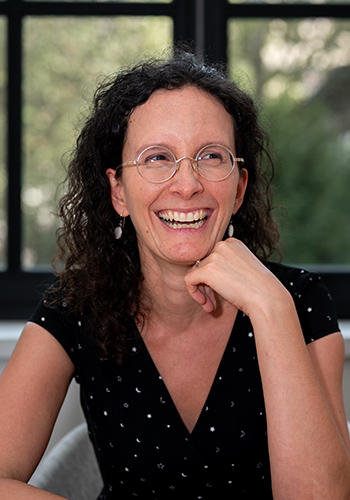Why a career in tech?
I have always enjoyed scientific disciplines, particularly biology initially. I discovered programming during preparatory classes, and I found it fascinating to understand how to make a computer do what I wanted.
Your professional experience?
After a scientific baccalaureate, I attended a biology preparatory class (BCPST). At that time, I aimed to pursue my career in research and wanted to join the Ecole Normale Supérieure (ENS). When I finally joined, I was delighted by the diversity of topics offered at ENS: it allowed me to explore economics, history of science, as well as cognitive science. I decided to continue my studies in this field to better understand the functioning of the human brain. After ENS, I did a PhD to better understand how our brain interprets what it perceives. I found this experience fascinating. However, at the end of my PhD, I decided not to continue in academic research because, although I loved science, I disliked the constraints of research (long timeframes, the search for funding, the obligation to publish...). So, I chose to work in the corporate sector, despite having no prior experience in that environment. It was a real challenge for me, but I eventually found a position as a data scientist at Kernix, a company that was building a data science consulting practice. I quickly had to lead the team with another data scientist. It was a very enriching experience with a multitude of subjects. Later, I joined Kering, the group of Gucci, Saint Laurent, Balenciaga, and other luxury brands, to create a data science team within the group. Finally, I had the opportunity to expand my responsibilities to other teams that provide data expertise to brands on data analysis and business intelligence.
Your first experience with technology?
My experience at Kernix is what I consider my first experience in tech. I came from a research background and joined a company whose core business was web development. It was a very enriching experience where I learned a lot, especially from a technical perspective. The technical manager helped me improve the quality of my code, I was in daily contact with the DevOps team, and I also interacted with the developers. I truly discovered these professions and the challenges of tech through this experience.
What do you do today, and why?
Today, I oversee 5 teams that bring various expertise on data usage to Kering's brands. I seized this opportunity because it was a chance for me to face broader issues, both technically (for example, I learned a lot about business intelligence that I knew nothing about when I was only responsible for the data science part) and from a managerial perspective (I discovered how to supervise other managers).
Your strengths in this role?
I have a good ability to manage many topics in parallel and to find the right level of detail where I need to go to be relevant for my teams. Additionally, I have a good empathetic capacity (I believe being a mother helped me develop it), allowing me to help my teams develop while quickly identifying problems or points of friction that need to be resolved before they become too significant.
Past challenges, failures and disappointments?
One of the great challenges I experienced was at the end of my thesis when I knew I did not want to pursue an academic career but had no idea what my options could be. I spent 2 hours a week thinking about the future, and I was really struggling with this question in mind "what am I going to do with my life." Later, I obviously led projects that did not work as I wished and had to confront clients to explain the complexity we encountered in the data. But these difficulties were more opportunities for learning to find the best way to work together, simultaneously training them in data science and dispelling the myth of the magic wand.
Best moments, successes you’re proud of?
I have been fortunate to experience many, especially because I have always worked in very warm teams. The human dimension of work is key for me. I had the opportunity to work on diversity and inclusion issues within Kering. It was a source of very enriching encounters, and I learned a lot, especially from a managerial perspective, working on this issue. In terms of success, there are two dimensions. The first is projects that have been implemented and really simplify the way people concerned work. The second is when I look at the teams I have created and see their members genuinely happy to work on these topics with these colleagues. It is always difficult as a manager to receive positive feedback, whereas when you code, you immediately knew if what you did works. So, it is all the more satisfying to realize when a team works well together, even if it is always difficult to know what is really related to what we did.
People who helped, influenced -or made your life difficult?
I have a wonderful role model in my mother, who had a very successful career in applied mathematics while raising 5 children. Nothing seemed complicated to me when I was little! Later, I had the chance to meet incredible people in all my experiences and learned a lot from them. For example, I had the opportunity to create the data science team at Kernix in tandem with one of my colleagues. I loved this experience because we could learn together the role of a manager, ask questions, exchange ideas without any hierarchical relationship. It is rare in managerial roles where I feel there is less of a sense of a team with peers, and I found it very valuable.
Your hopes and future challenges?
In the medium term, I would like to use my experience in data usage to contribute to a project with a stronger societal or ecological impact.
What do you do when you don’t work?
Outside of work, I spend a lot of time with my 6-year-old and 1-and-a-half-year-old daughters. I love seeing them grow and change every day. I am also a big food lover! I like to enhance my knowledge of restaurants and good pastries in Paris.
Your heroes -from History or fiction?
I admire Rosa Parks a lot for her courage in refusing humiliation.
A saying or proverb you like in particular?
"What is well-conceived is clearly expressed, and the words to say it come easily." I think Boileau perfectly expressed what to aim for when presenting a data analysis.
A book to take with you on a desert island?
I love detective stories, especially those by Fred Vargas, but one would not be enough for me on a deserted island!
A message to young female professionals?
Do not let men define the solutions of tomorrow alone. Tech is at the heart of our lives, and if we do not participate in creating tech products by getting our hands into the code and models, current societal biases will also be present in tech. You have a different worldview that needs to be integrated into tech products. Moreover, pragmatically, it is a sector with many professional opportunities and high salaries; it would be a shame not to take this opportunity!



